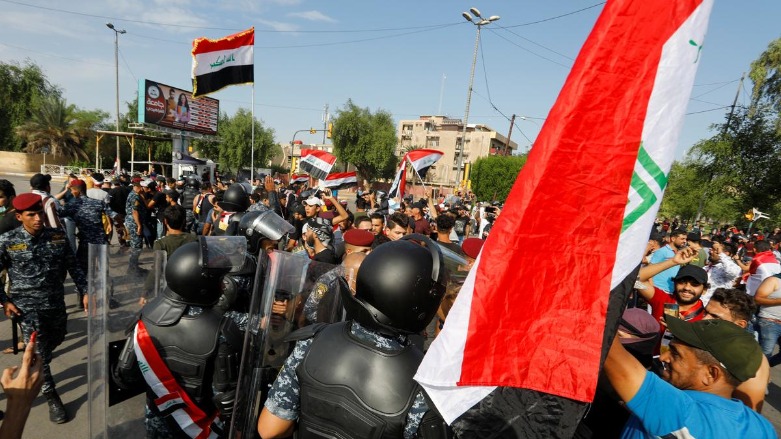Iraqi protests resume in Baghdad; 2 reported dead, at least 350 injured

ERBIL (Kurdistan 24) – Thousands of people marched towards the Iraqi capital’s fortified Green Zone on Friday in the latest day of anti-government protests that have so far led to the death of at least one demonstrator and injury to 350 others, despite officials' promises that security forces would "protect" civilians.
Riot police used tear gas and stun grenades to disperse protesters as they approached the secured part of Baghdad that houses multiple government offices, politicians' residences, and diplomatic missions are located. Reuters cited Iraqi police and medical sources as reporting that the protester had died after being struck in the face by a tear gas canister and that over 350 had been wounded.
Earlier in the day, a member of the High Commission for Human Rights in Iraq claimed that there had been two deaths, with 67 individuals on both sides injured and 109 cases of asphyxiation due to the use of tear gas. On Monday, the body called on the federal government to fulfill previous promises it has made to protestors and implement a recent reform package.
Read More: Iraq’s human rights commission calls on Baghdad to fulfill promises to protesters
A wave of violent, nationwide protests began earlier this month. Security forces cracked down on protesters, with many accusing them of using excessive force and gunfire to prevent the protests from spreading, leading to the deaths of at least 140 and thousands more injured.
Iranian-backed Shia militias, known as the Popular Mobilization Forces (PMF), were also alleged to have deployed snipers to target protesters. Tehran is a major stakeholder in the Iraqi government and supports multiple political factions, most notably the political wings of PMF militias.
After a week of unrest in early October, crowds died down temporarily but organizers promised to take to the streets again on Friday, demanding meaningful reform, an end to rampant corruption, and the facilitation of increased employment for the general population. The Iraqi government has said it was struggling to meet protesters' "legitimate" demands and promised to prosecute security leaders responsible for deaths and injuries among them.
Prime Minister Adil Abdul Mahdi offered purportedly sweeping programs of reform and a cabinet shuffle in attempts to assuage public anger. Protesters, however, were largely undeterred, seeing the promises insufficient to solve Iraq’s chronic corruption that has led to the institutional waste of the country’s large wealth of natural resources.
On Saturday, firebrand cleric Muqtada al-Sadr expressed support for the national protests, saying that the political class has been unable to address the people’s dire situation.
Read More: ‘It's too late:’ Populist Iraqi cleric Sadr sides with protesters
“All the politicians and the government are living in horror and hysteria from the people’s rise,” Sadr said in his statement, adding, “All of them are trying to remedy their situation, but they have not and will not be able to do so. It's too late.”
Editing by John J. Catherine
